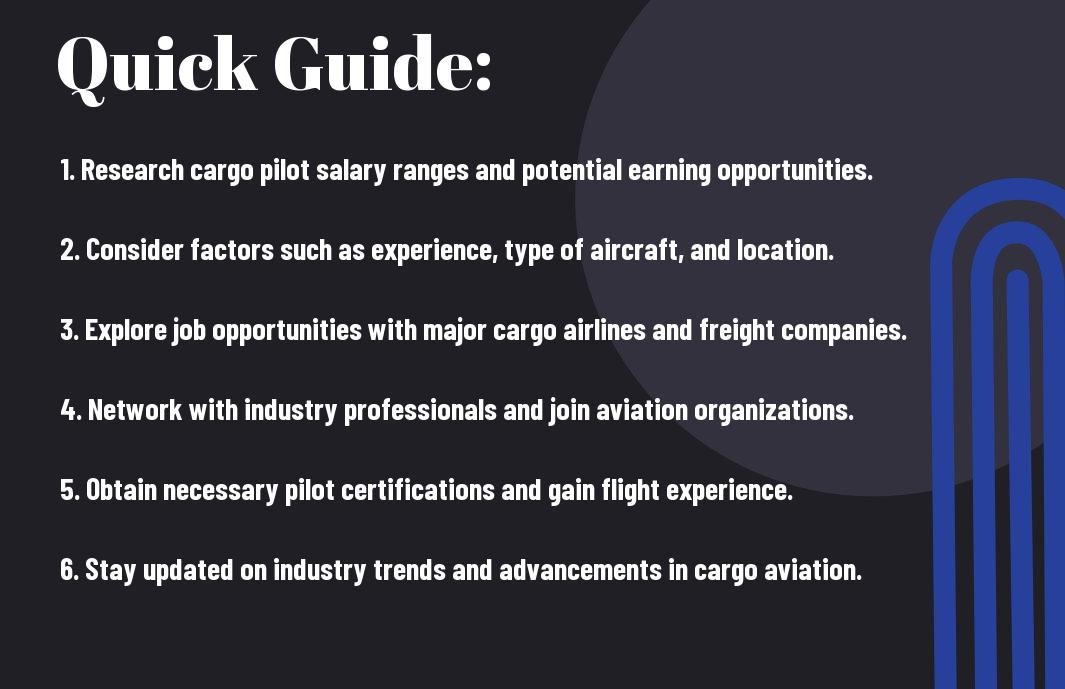As aviators, we are often fascinated by the high-flying world of cargo pilots and the fascinating career of transporting goods across the globe. In this guide, I will take you through the ins and outs of this exhilarating career path, including the dangerous and exciting aspects, as well as the all-important question: How much do cargo pilots really make? Flying cargo planes comes with its own set of challenges and rewards, and I will provide you with all the necessary information to help you decide if this career is the right fit for you.
Key Takeaways:
- Earning Potential: The salary of cargo pilots can range from $47,000 to $195,000 per year, with potential for bonuses and benefits.
- Experience Matters: Experienced cargo pilots with advanced training and certifications can command higher salaries and better job opportunities.
- Industry Growth: The demand for cargo pilots is expected to increase in the coming years, creating more job opportunities and potentially higher earning potential.
- Work-Life Balance: Cargo pilots often have irregular schedules and may spend extended periods away from home, impacting their work-life balance.
- Educational Requirements: Becoming a cargo pilot typically requires a bachelor’s degree in aviation, as well as obtaining a commercial pilot’s license and additional certifications.
Types of Cargo Pilots
For those interested in pursuing a career as a cargo pilot, it’s important to understand the different types of pilots in this field. Here are the main categories:
| Category | Description |
| 1. Airline Cargo Pilots | Employed by major airlines to transport freight on scheduled routes |
| 2. Charter Cargo Pilots | Hired by charter companies to fly cargo on an ad-hoc basis |
| 3. Independent Cargo Pilots | Self-employed pilots who operate their own aircraft to transport freight |
| 4. Military Cargo Pilots | Part of the military forces, responsible for transporting cargo in combat and non-combat operations |
| 5. Cargo Instructor Pilots | Trained professionals who teach and mentor aspiring cargo pilots |
This comprehensive breakdown of the types of cargo pilots gives aspiring aviators a clear understanding of the various career paths available in the industry.
Airline Cargo Pilots
As an airline cargo pilot, you’ll be responsible for transporting freight on scheduled routes for a major airline. This role offers the security of a stable career with a regular paycheck and benefits. However, it also comes with the pressures of meeting strict flight schedules and the potential for long hours away from home.
Charter Cargo Pilots
Charter cargo pilots are employed by charter companies to transport cargo on an ad-hoc basis. This type of piloting offers more flexibility in terms of schedule and flying destinations compared to airline cargo pilots. However, it can also involve irregular hours and the need to adapt quickly to changing flight requests.
Tips for Aspiring Cargo Pilots
Assuming you have a passion for flying and a desire to pursue a career as a cargo pilot, there are several tips to keep in mind as you navigate your path towards this high-flying career.
- Obtain a solid education and training in aviation, including earning a commercial pilot’s license and instrument rating.
- Consider joining the military to gain valuable flight experience and training.
- Seek opportunities to gain experience flying cargo aircraft through internships, flight instructing, or other related positions.
- Network with established cargo pilots and other professionals in the industry to gain insights and potential job opportunities.
- Stay updated on industry trends and advancements in cargo aviation to remain competitive and knowledgeable.
This set of tips can help guide you as you work towards becoming a successful cargo pilot in the freight industry.
Flight Training
When pursuing a career as a cargo pilot, obtaining the necessary flight training is essential. This includes obtaining a commercial pilot’s license, instrument rating, and multi-engine rating. Flight training will provide you with the essential skills and knowledge needed to operate large cargo aircraft safely and efficiently.
Gaining Experience
Gaining experience is crucial for aspiring cargo pilots. This may involve working as a flight instructor, flying smaller cargo aircraft, or gaining experience in other relevant positions within the aviation industry. The more flight hours and experience you have, the more competitive you will be when pursuing cargo pilot positions.
Networking
Networking with established cargo pilots, aviation professionals, and industry organizations can provide valuable insights and opportunities for aspiring cargo pilots. Building relationships and connections within the industry can open doors to potential job offers and mentorship opportunities that can help further your career as a cargo pilot.
Step-by-Step Guide to Becoming a Cargo Pilot
Unlike commercial airline pilots, cargo pilots typically follow a different career path to achieve their wings. Becoming a cargo pilot takes dedication, skill, and a strong commitment to safety and efficiency. Here’s a step-by-step guide to help you achieve your dream of becoming a cargo pilot.
Education and Training Requirements
To become a cargo pilot, you will need to complete a rigorous training program through a certified flight school or aviation university. I recommend obtaining a bachelor’s degree in aviation or a related field to gain a comprehensive understanding of aviation principles and practices. Additionally, you will need to obtain a commercial pilot’s license and logging a minimum amount of flight hours, typically around 1500 hours, to qualify for most cargo pilot positions.
Obtaining Certifications and Licenses
Once you have completed your education and logged the required flight hours, you will need to obtain various certifications and licenses to qualify for cargo pilot positions. This typically includes obtaining a multi-engine rating, instrument rating, and an Airline Transport Pilot (ATP) certificate. These certifications and licenses demonstrate your proficiency and expertise in handling complex aircraft and navigating challenging weather conditions.
Finding Employment Opportunities
When it comes to finding employment as a cargo pilot, you may need to start by gaining experience as a flight instructor, charter pilot, or regional airline pilot before advancing to a cargo pilot position. The cargo pilot industry is highly competitive, so gaining experience and building a strong reputation for safety and professionalism is crucial. Keep an eye on job postings from cargo airlines and freight companies, and network with industry professionals to uncover potential opportunities.
Factors Affecting Cargo Pilots’ Salaries
To become a cargo pilot, several factors come into play to determine your potential salary. These factors can range from your experience level to your geographical location.
- Experience: The amount of flight experience you have plays a crucial role in determining your earning potential. Typically, the more flight hours and years of experience you have, the higher your salary will be.
- Type of Employer: The type of employer you work for can also impact your salary. Major cargo airlines often offer higher salaries compared to smaller, regional carriers.
- Geographic Location: Where you are based also affects how much you can earn as a cargo pilot. Major metropolitan areas and regions with higher costs of living generally offer higher salaries.
Assume that all three of these factors are important in determining your potential salary as a cargo pilot.
Experience
When it comes to earning potential as a cargo pilot, experience is a key factor. As you gain more flight hours and years of experience, you can expect to see your salary increase. Cargo airlines value experienced pilots who can safely and efficiently transport freight to various destinations. Additionally, having experience in specific types of cargo aircraft can also lead to higher earning potential.
Type of Employer
The type of employer you work for can significantly impact your salary as a cargo pilot. Major cargo airlines, such as FedEx and UPS, generally offer higher salaries and better benefits compared to smaller, regional carriers. These larger airlines often have more resources and a broader reach, leading to increased earning potential for their pilots.
Geographic Location
Believe it or not, where you are based also plays a role in determining your potential salary as a cargo pilot. Major metropolitan areas and regions with higher costs of living typically offer higher salaries to compensate for the increased expenses. However, it’s essential to consider the demands and competition for cargo pilots in a particular area, as this can also influence earning potential.
Pros and Cons of a Career as a Cargo Pilot
Now let’s take a closer look at the pros and cons of pursuing a career as a cargo pilot. As with any profession, there are both benefits and drawbacks to consider before embarking on this high-flying career path. Below is a breakdown of the pros and cons of being a cargo pilot.
Pros
One of the most appealing aspects of being a cargo pilot is the opportunity to travel to diverse destinations around the world. As a cargo pilot, you will have the chance to explore new cultures and see incredible sights as you transport goods across the globe. Additionally, the high demand for cargo pilots means that there are often ample job opportunities available, providing job security and potential for career advancement. Furthermore, cargo pilots typically enjoy more flexible schedules compared to commercial airline pilots, allowing for a better work-life balance.
Cons
On the flip side, a career as a cargo pilot can also come with its own set of challenges. Long hours and irregular schedules are common, which can lead to fatigue and time away from home. Additionally, flying cargo planes can be more physically demanding than flying passenger planes, as cargo planes often require manual loading and unloading of freight. Moreover, cargo pilots may be exposed to greater risks, such as flying through adverse weather conditions or landing on smaller, less developed airstrips.

How Much Do Cargo Pilots Make – Exploring High-Flying Careers in Freight
Drawing together all the information about the earning potential of cargo pilots, it is clear that this career path offers significant financial rewards. With the demand for air freight continuing to grow, the prospects for cargo pilots look promising. If you are someone who is passionate about aviation and enjoys the idea of traveling to different destinations while earning a competitive salary, then a career as a cargo pilot may be the perfect fit for you. The opportunities for career advancement and the potential to earn a high income make this profession an attractive option for those with the necessary skills and qualifications. While the training and experience required to become a cargo pilot may be rigorous, the potential financial rewards make it a worthwhile investment in your future.
FAQ
Q: What is the average salary for cargo pilots?
A: The average salary for cargo pilots varies depending on experience, type of aircraft, and employer. On average, cargo pilots can expect to earn between $75,000 to $200,000 per year.
Q: What factors contribute to the salary of cargo pilots?
A: Cargo pilots’ salaries are influenced by factors such as the type of cargo they fly, their level of experience, the size of the aircraft they operate, and the geographical location of their employment.
Q: Are there opportunities for career advancement in the field of cargo piloting?
A: Yes, cargo pilots have opportunities for career advancement. They can progress to higher-paying positions such as Chief Pilot, Director of Operations, or other management roles within the airline or cargo company.
Q: What are the advantages of being a cargo pilot in terms of salary and benefits?
A: Cargo pilots often enjoy higher salaries and more flexible schedules compared to commercial airline pilots. They may also receive additional benefits such as signing bonuses, relocation assistance, and opportunities for profit sharing or performance-based bonuses.
Q: What qualifications and training are necessary to become a cargo pilot?
A: To become a cargo pilot, individuals must obtain a commercial pilot’s license, accumulate a certain number of flight hours, and pass the required exams and medical certifications. They may also need additional training and type ratings for specific aircraft. Additionally, a college degree in aviation or a related field is often preferred by employers.

